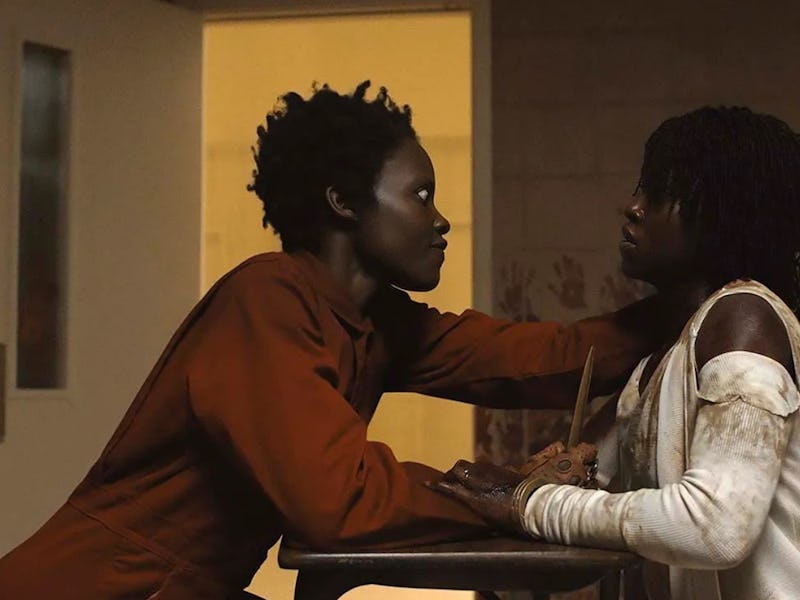Jordan Peele’s Weirdest Film Has Also Proven to be His Most Prescient
We’ve all buried something.

Just five years have passed since writer-director Jordan Peele’s horror hit, Us, barnstormed multiplexes, but so much has happened in the United States that it’s only deepened the title’s double meaning. You know the plot: four demented doppelgangers terrorize an all-American family, the Wilsons, in a summer home invasion. “It’s us,” observes the youngest Wilson, Jason (Evan Alex), as he and his family confront their evil clones. That was the trailer soundbite before the film’s release, but in an election year when its political undertones feel scarier than ever, Us can also be read as an abbreviated title. This is a movie that’s as much about the States as the wider narrative of “us” versus “them.”
Us begins with text about “tunnels beneath the continental United States.” On TV, the Hands Across America map fades to the reflection of young Adelaide (Madison Curry), framing her as a surrogate for the audience and the national consciousness. The tunnels, we eventually learn, are where the “Tethered” clone army has planned a coordinated attack on the surface world, starting with the Wilsons. The trouble is, when not storming private residences, they aren’t always distinguishable from nonviolent citizens. They look like “us,” and while they don’t exactly talk like us (it’s more a croaking sound), they might well be our own family members.
Lupita N’yongo is commanding in her dual role as Adelaide, Jason’s mother, and Red, leader of the Tethered. With Winston Duke’s dad energy providing comic relief, Us becomes a thrilling funhouse hall of mirrors, like the one where Young Adelaide first encounters her bizarro, backward-facing twin. Yet below the adrenaline rush of its chase scenes and dancing fights, Us really wants to unearth what’s down in those tunnels — history’s subterranean secrets, personified as oppressed lookalikes. The redness transcends character names, blood stains, albino rabbit eyes, emergency exit signs, and the color of the opening credits. In the least subtle bit of symbolism (besides the “We’re Americans” one-liner), news reports emphasize that the Tethered wear red, too.
During the production of his first Oscar-winning film, Get Out, Peele, a Democrat, had worked with Trump-supporting crew members just prior to the 2016 election. Typified by the line, “I would have voted for Obama for a third term if I could,” that movie satirized white liberals. By the time Us hit theaters, however, MAGA red had entered the White House. In a more heated political climate, Peele could have easily made a simplistic movie where the Tethered’s red jumpsuits only represented Trump’s hats. Instead, Us delivers a complex, layered narrative where two things can be true, even when one seems much worse than the other.
Red often mentions God in a quasi-Christian nationalist way, and among the many Easter eggs, there’s an actual “dark Easter” story, as Peele has called it. It’s a scissors-and-sandals epic, complete with bunnies and Jeremiah 11:11 (“Behold, I am bringing disaster upon them that they cannot escape...”) heralding divine wrath. A candy apple precedes Adelaide’s original sin, but when “the mirror girl” finally comes for her, we’re rooting for her family and against Team Red. This continues until a twist ending recontextualizes everything, exposing a deep rot in American culture.
If nothing else, it will be a while before you’re comfortable using scissors again.
The opening commercial advertises the ending, characterizing it with jingoistic lyrics like “purple mountains” lifted from “America the Beautiful.” Ideally, blue and red would make purple, but the mountains in Us are money-green with a line of hands snaking through them. What’s left is one big desolate crime scene, with bodies strewn on the ground and news helicopters hovering in the air. The amusement park, with its glowing promises of pleasures to be had, loses its fantasy sheen, revealing daylight devastation. It’s the death of the American dream, brought to you live.
With the Untethering, Us delivers a more indirect vision of the Union collapsing than the plot of the upcoming Civil War. Trading guns for golden scissors, the Tethered are still merciless as they snip and sever the ties that bind. But the real terror of the movie’s national divorce is the realization, for one character, that their loved one is also a monster who will stoop to the same level of murderous savagery as the Tethered.
So much of horror is predicated on fear of the Other, but Us raises bigger thematic concerns that leave you wondering who among “us” is really “them.” Are we all Adelaide, alone in the dark, surrounded by mirrors, each unmasking a different face of horror? Which is the face of the protagonist who hasn’t reckoned with the wrongdoing of improving their life at someone else’s expense?
“When you point a finger at someone else, you have three pointing back at you,” Jason says. He’s the one character capable of coexisting with his scarred doppelganger, Pluto, for some tense, match-lit closet playtime. Soon, he realizes Pluto will mirror his movements even if it means walking backward into a fire. With a sinister chuckle, Red warns them, “Don’t burn our house down.”